The Lithuanian Jewish Community and LJC chairwoman extend our deepest condolences on the death of Adolfas Šleževičius to his many friends and relatives. The Lithuanian prime minister from 1993 to 1996 was born February 2, 1948 and his parents rescued Jews from the Holocaust. His Government stabilized the Lithuanian economy not least of all through the re-introduction of the Lithuanian currency the litas, and through improved relations with neighboring countries in the aftermath of the break-up of the Soviet Union. He is the author of over 50 articles and two books. Both his parents were recognized as Righteous Gentiles in 1994 by the Yad Vashem Holocaust Commemoration and Education Institute in Jerusalem.
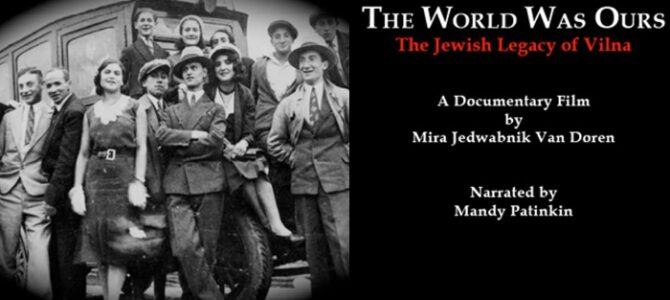
Upcoming Vilnius Jewish Public Library Events
The Vilnius Jewish Public Library presents a lecture by Oleksii Chebotarov called “Topography of Pogroms: Spatial and Social History of Anti-Jewish Violence on the Imperial Peripheries” on December 15.
On December 22 the library will feature an evening of poetry and music by Leonard Cohen.
On December 29 the library will screen the made-for-tv documentary film “The World Was Ours” (2007) about the pre-WWII Jewish community of Vilnius. According to imdb:
“A documentary chronicling the rich, vibrant history of the Jewish community of Vilna (then Poland, now Lithuania) known as ‘The Jerusalem of Lithuania’ before its destruction in World War II.”
For more information, send an e-mail to vzvbvjpl@gmail.com or call 8 604 15765.
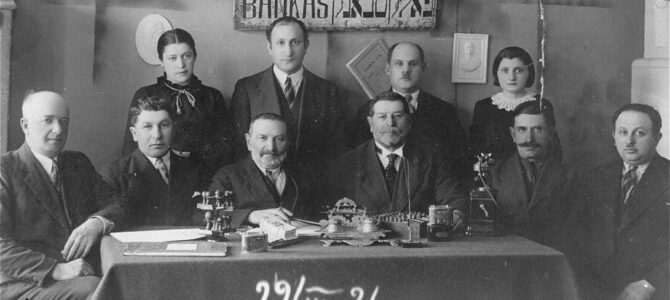
World Jewish Restitution Organization Welcomes Lithuanian PM’s Proposal for Holocaust-Era Property Restitution
The proposed legislation provides €37 million as symbolic compensation for private property expropriated during the Holocaust and addresses heirless Jewish property.
New York, NY, November 20, 2022–The World Jewish Restitution Organization (WJRO) welcomes legislation introduced by Lithuanian prime minister Ingrida Šimonytė addressing restitution claims of Holocaust victims. The new legislation being proposed by the government would provide €37 million as symbolic compensation to private claimants and to the Lithuanian Goodwill Foundation with respect to heirless Jewish property.
Prime minister Šimonytė’s proposal is an important step to providing a measure of justice to Lithuanian Holocaust survivors and their families for the horrors they suffered during World War II and its aftermath. We look forward to the opportunity to review this new legislation which would continue the process of property restitution and support Jewish life in Lithuania.
Over a decade ago following intensive negotiations with the Lithuanian Jewish Community and WJRO, the Lithuanian parliament, the Seimas, passed legislation to pay €37 million in compensation for former Jewish communal property. This payment represented only a partial value of the properties, but it provided much needed funds to support Jewish communal life in Lithuania, restored several Jewish heritage sites and offered modest payments to needy survivors.
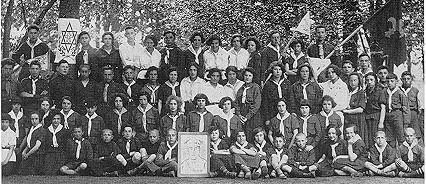
Jewish Scout Jamboree
The Lithuanian Jewish Community invites all students to attend a Jewish scouting jamboree under the guidance of scout leader Adomas Kofman at 2:00 P.M. on December 4 at the Ilan Club at the Lithuanian Jewish Community located at Pylimo street no. 4 in Vilnius. Contact skautai@lzb.lt for more information.„“
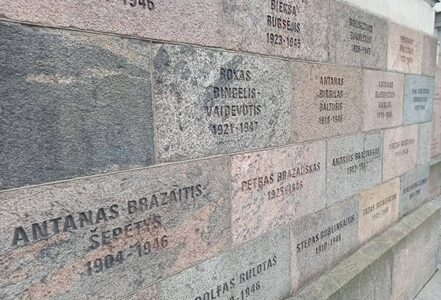
NATO 2023 in Lithuania: Rife with Political Pitfalls
Photo: Outer wall of so-called Genocide Museum on Vilnius’s main street near parliament. Personal collection.
by Grant Gochin
One of the greatest public relations catastrophes of president Reagan’s tenure was his May, 1985, visit to a cemetery in Bitburg, Germany, which contained numerous members of the SS. Today, nearly four decades later, the visit is still remembered with anger, amazement and mostly, for America, embarrassment.
NATO has announced that the next meeting of NATO heads of state and government will be held in Vilnius, Lithuania, on July 11-12, 2023. There are, unfortunately, obvious parallels to Reagan’s “goodwill” visit to Bitburg.
In World War II, and primarily in the second half of 1941, about 200,000 Lithuanian Jews–about 96%–were systematically expelled from their homes, robbed, starved, tortured, and brutally murdered primarily by ethnic Lithuanian death squads euphemistically referred to as “auxiliary police” units. Lithuania does not acknowledge the fact that most of the mass murderers were ethnic Lithuanians. To the contrary, Lithuania in many cases has elevated the stature of many of those who led the Lithuanian Holocaust, arguing that they were anti-Soviet. This itself is an echo of the Nazis’ canard conflating Jews with Communism.
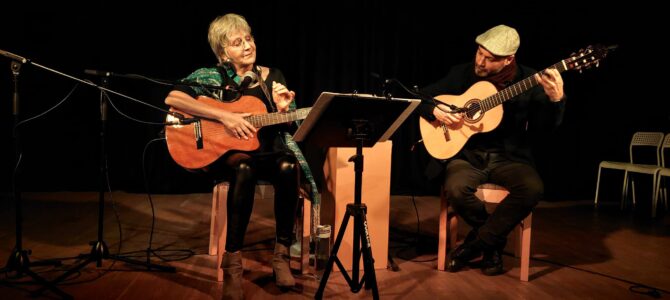
Alejandra Czarny Yiddish Music Concert in Kaunas Great Success
Kaunas Jewish Community chairman Gercas Žakas reports the concert of Yiddish music by vocalist Alejandra Czarny and Michel Gonzalez on guitar in Kaunas was a great successe with the audience.
The concert was part of a series the Kaunas Jewish Community has been putting on called “Yiddish Hear Again in Kaunas.” This concert was called “Inspired by Grandmother’s Songs.” Czarny’s grandmother and that side of the family all came from Kaunas. She’s a transplant to south Florida from Argentina and charmed the audience with tango melodies along with Yiddish favorites, which became sing-alongs with the audience, and Alejandra Czarny’s own creations which at times evoked Venezuelan music, according to Gercas Žakas.
Alejandra Czarny and Michel Gonzalez were also scheduled to perform at the restored synagogue in Alytus on November 30.
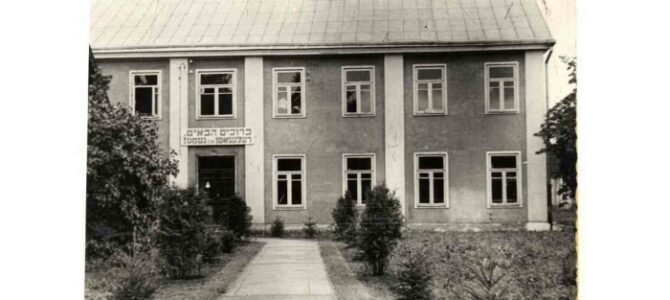
Split Identity: Jewish Scholarship in the Vilna Ghetto
Photo: Exterior of YIVO building in Vilnius, ca. 1933. Courtesy YIVO.
by David E. Fishman
ABSTRACT
In this essay David Fishman draws a comparison between yidishe visnshaft, or Jewish studies scholarship, and Judenforschung, the Nazi field of anti-Semitic Jewish studies used to justify the persecution and extermination of Jews in scientific terms. He examines the work of Zelig Kalmanovitch, who had been a well-known scholar and co-director of YIVO before World War II, during the time when he was forced to produce scholarship as a member of the Jewish slave labor brigade assigned to the Einsatzstab Reichsleiter Rosenberg (ERR) in Vilna. Fishman notes the remarkable scholarly accomplishments Kalmanovitch was able to achieve in a time of enormous adversity. He also demonstrates several junctures in which Kalmanovitch, a meticulous scholar, omitted facts or altered scholarship in order to save lives. These dual impulses of preserving historical truths about Jewish communities and a willingness to obscure facts over which people could be killed contribute to Fishman’s assessment that Kalmanovitch’s scholarship emerged from erudition, love and dedication to the Jewish people about whom he wrote, the very opposite of the purposes for which his scholarship was obtained by his Nazi slave masters.
܀
On June 16, 1942, Herbert Gotthardt, a staff member of the Einsatzstab Reichsleiter Rosenberg (ERR) in Vilna, instructed Zelig Kalmanovitch to prepare an essay and bibliography on the Karaïtes. Kalmanovitch, a well-known scholar and co-director of YIVO before the war, was a member of the Jewish slave labor brigade assigned to the ERR which segregated Jewish and other books, manuscripts and documents into two categories: valuable items to be sent to Germany, and valueless items to be destroyed. The former YIVO co-director was an expert bibliographer in this work brigade, nicknamed the paper brigade, based in the YIVO building at 18 Wiwulskiego Street. The brigade was headed by librarian Herman Kruk and consisted of twenty physical laborers and twenty intellectuals, including the Yung-Vilne poets Abraham Sutzkever and Szmerke Kaczerginski.
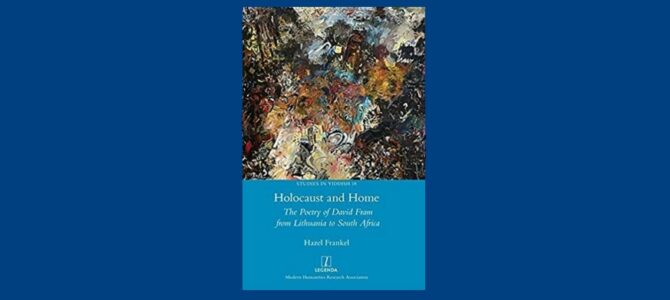
Holocaust and Home: The Poetry of David Fram from Lithuania to South Africa
Cover: Hazel Frankel, “Holocaust and Home: The Poetry of David Fram from Lithuania to South Africa.” Legenda, 2021. 230 pp.
My mother started learning Yiddish late in life. I felt as if she was reaching out to her dead parents, trying to connect with them. Both her mother and her father were immigrants to South Africa from Lithuania, one from the town of Shadova, the other from Pokroy. My grandfather, Abe, who came from a long line of yeshiva bochers, attended the famed Telz yeshiva. Intellectually curious, he read War and Peace in the original Russian. Later, at the Claremont shul in Cape Town, he gave many of the Saturday afternoon shiurim, written in Yiddish but delivered in English.
His wife, Anne, for who I am named, was nine years his junior. They owned a dress shop in Cape Town and, before the war, Abe went on business trips to Europe to buy the latest fashions, often with specific customers’ needs in mind. Both Abe and Anne died in their fifties, several years before I was born. I know them only from photographs. Their sepia-toned wedding photo hung in our breakfast room, where we ate all our meals. Abe was short, wore glasses, and gazed solemnly at the camera. Anne seemed softer, gentler, and had a twenties-style headdress that looked like a shower cap. There were odd flecks of white on the image that I always imagined was confetti but must have been blemishes on the photographic paper or the camera lens.
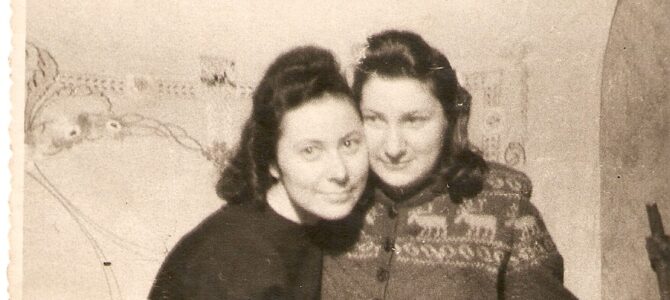
Condolences
Righteous Gentile Janina Vansovičiūtė-Grigaliūnienė has died. We extend our deepest condolences to her friends and family members.
Janina Vansovičiūtė-Grigaliūnienė, then Janina Vansovičiūtė, lived in an apartment in Kuršėnai which her parents had rented with Sofia Vashkevitch, who was using forged documents showing she was Janina’s sister. After the war both girls returned to the Vansovičius home in Raseiniai. Janina and her parents Jonas and Natalija were recognized as Righteous among the Nations by the Yad Vashem Holocaust authority in 2011.
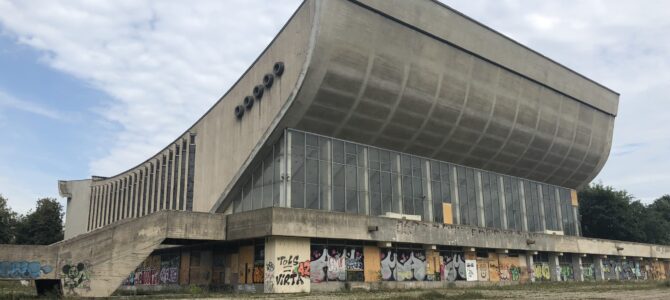
Lithuanian PM Says Plans for Litvak Museum at Sports Palace Bogged Down
Lithuanian prime minister Ingrida Šimonytė told Baltic News Service the idea to establish either a museum or a memorial dedicated to the history of the Litvaks at the Vilnius Palace of Sports complex could turn out to be a long and difficult process.
“It’s on-going, but in order to create a truly meaningful and thus memorable site about the Jews of Lithuania, we’ll have to work hard. The commission will select ideas to be adopted by consensus,” she said.
She cautioned decision-making on the concept could become bogged down and generally difficult. She said this commission will include academics, rabbis, historians and others from Lithuania and other countries and is scheduled for formation by the end of 2022. The idea since 2015 when the Lithuanian state privatization bank Turto bankas acquired the property has been to turn the Palace of Sports built in 1971 and now falling into ruin into a conference center. Different Jewish groups have opposed that plan because the Palace of Sports was built inside the old Jewish cemetery in Vilnius.

Happy Birthday to Daumantas Levas Todesas
We wish you with all our hearts the very best, the greatest health, success in your varied endeavors and the joy and warmth of friends and family. You have served us so long in so many capacities it would take a book-length post to list them all here, not least being your work as the chairman of the Vilnius, Jerusalem of Lithuania Jewish Community, as a member of the board of the Lithuanian Jewish Community and as chairman of the Ethnic Communities Council at the Lithuanian Department of Ethnic Minorities. Mazl tov. Bis 120!

Happy Birthday to Boris Gelpern
The Lithuanian Jewish Community wish Boris Gelpern a very happy birthday. We wish you fantastic health and happiness. May our wishes for your longevity echo out and repeat forever. Mazl tov. Bis 120!
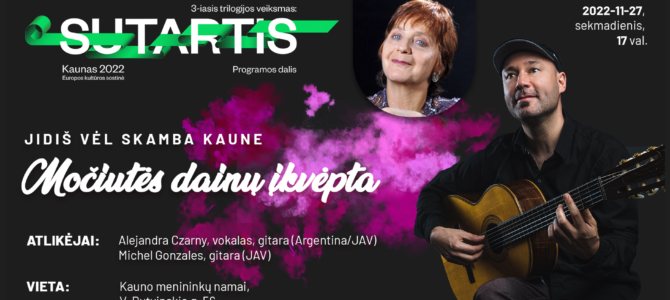
Yiddish Concert in Kaunas
The Kaunas Jewish Community invites you to their concert “Yiddish Heard Again in Kaunas: Inspired by Grandma’s Songs” at 5:00 P.M. on Sunday, November 27 at the Kaunas Artists’ House located at V. Putvinskio street no. 56 in Kaunas.
Alejandra Czarny of Argentina and more recently the United States with firm family roots in Kaunas will sing accompanied by Michel Gonzales on guitar, including Litvak Yiddish from different periods and Yiddish songs from Argentina and South America. Besides singing Yiddish her entire life, she also has her own radio program and is a cantor for synagogues located in South Florida, where she lives.
The concert is free and open to the public, but prior registration is required by filling out the form here:
Condolences
Uogė Ieva Dargienė, a member of the Union of Former Ghetto and Concentration Camp Prisoners, has passed away. She was born in 1931. We extend our deepest condolences to her sister Jadvyga and niece Rima.

Happy Birthday to Yosif User
We wish Yosif User, founder and editor-in-chief of the weekly Pensioner and former editor-in-chief of the Obzor Russian-language news site in Lithuania as well as a member of the Lithuanian Jewish Community, a very happy birthday. Dear Joseph, with all our hearts we wish you good health, energy, optimism, joy and warmth! Mazl tov. Bis 120!

Jewish Scouts Hike in Pilaitė Neighborhood of Vilnius
The hike by Jewish scouts through the woods in the Pilaitė neighborhood of Vilnius took place as planned on Friday evening, November 18. The cold wasn’t able to dampen their spirits. Thank you to everyone who took part and weren’t driven off by the light snowfall, and to the organizers. Stay tuned for more scouting activities in the near future.
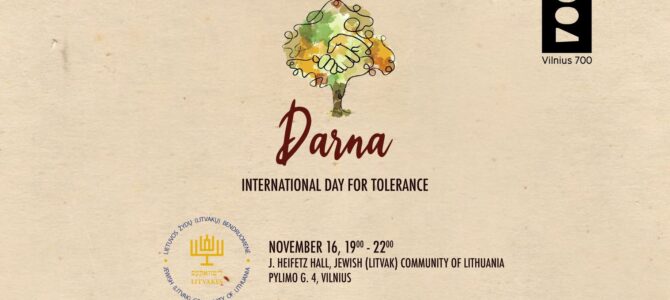
LJC Celebrates Tolerance Day with Darna Event
The first Darna event was held in 2020 during the corona virus panic. Despite many restrictions that time we were able to do more than we had expected, creating an entire virtual festival to mark the International Day of Tolerance. We tried to show during that tough time what diverse and interesting things we have right here in Lithuania, and how these differences are not only interesting, but complement one another perfectly. Today we are very happy to announce we can continue this event for its third year in a row, only this time we can meet face-to-face at the Lithuanian Jewish Community in Vilnius. Everyone of all religious, ethnic and other backgrounds and of all views is invited to come have a cup of tea or coffee, listen to live music and sample Israeli street food from our Cvi Park kiosk starting at 7:00 P.M. on Wednesday, November 16, at the LJC. Note: please disregard earlier announcements which stated the event would be held at the Choral Synagogue. It will be held on the third floor of the LJC at Pylimo street no. 4 in Vilnius.
The event program is available here. Musical performers, cooking workshops and meaningful conversations from the first Darna festival can be found here. More information about this iteration of the celebration can be found here.
#InternationalDayOfTolerance
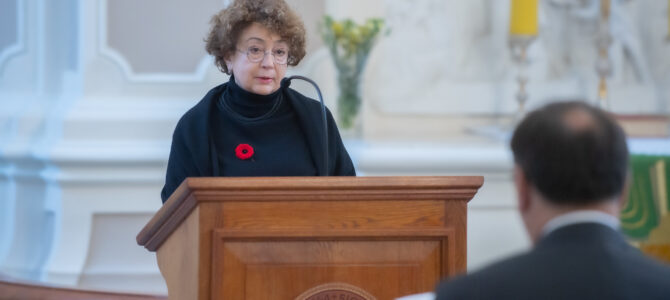
World War I Remembrance Day Marked
Lithuanian Jewish Community chairwoman Faina Kukliansky together with religious leaders and ambassadors resident in Vilnius took part in a Remembrance Sunday event held by the British embassy to Lithuania November 13 at the Evangelical Lutheran Church in Vilnius. She read from the Book of Ecclesiastes.
To every thing there is a season, and a time to every purpose under the heaven:
A time to be born, and a time to die; a time to plant, and a time to pluck up that which is planted;
A time to kill, and a time to heal; a time to break down, and a time to build up;
A time to weep, and a time to laugh; a time to mourn, and a time to dance;
A time to cast away stones, and a time to gather stones together; a time to embrace, and a time to refrain from embracing;
A time to get, and a time to lose; a time to keep, and a time to cast away;
A time to rend, and a time to sew; a time to keep silence, and a time to speak;
A time to love, and a time to hate; a time of war, and a time of peace.
(Ecclesiastes 3:1-8)

Evening Hike for Jewish Scouts and Young People in Vilnius
A hiking excursion in the Pilaitė neighborhood of Vilnius for Jewish scouts will be held at 5:00 P.M. on November 18. Young people in the 5th to 8th grades are also invited to make the hike and come and experience scouting for themselves. The hike is free but prior registration is required before 9:00 P.M. on November 15. For more information and to register, write skautai@lzb.lt or call scout leaders Audrius at +37061611505 or Adomas at +37060645094.
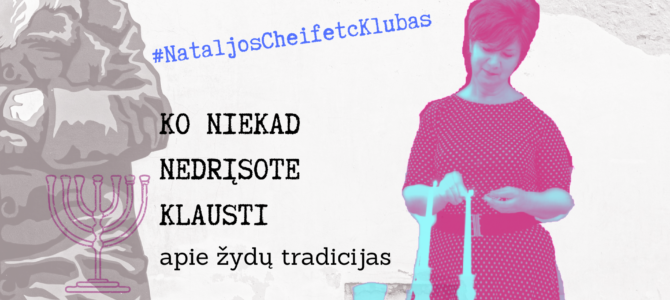
Shalom Discussion Club
Natlja Cheifec’s Shalom discussion club will hold a meeting Monday evening, November 14. To register, click here:
This coming meeting will discuss serious topic and questions from participants. Natalja also invites you to watch a video about the upcoming virtual meeting here:
https://www.youtube.com/watch?v=m0ug4OYhQg4
#NataljosKlubas #KlubasŠalom

